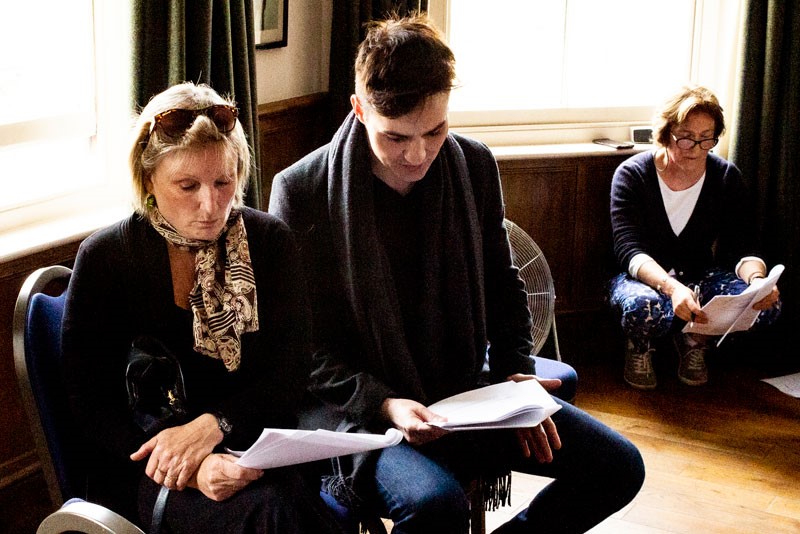Performance workshop on the course in May 2019 (L-R: Tamsin Heatley; Jos Vantyler and writer Joanna Gibbon)
John Retallack runs the Oxford Playwriting course which has recently been extended to include a second year for its students. With a wealth of directorial and writing successes across his own career, here he reflects back on the task of developing new plays on the course.
Running a course for playwrights, I feel my main job is to find what the writers want to say, how they want to say it and who they want to say it for.
In the heart of a very academic city, I have created a non-academic course that strives to be fully alert to the potential that each writer brings and to the audiences for whom they could write. The course takes place every week over 9 months; everyone keeps writing throughout the year, knowing that they have a group to share it with.
We all enjoy reading contemporary plays and seeing them live on stage – they become our reference points, our guiding lights.
Because my groups are limited to 8 writers, my aim is to ensure that each individual receives maximum personal attention. Each writer will finish 2 plays in the course of a year – a 40 minute play and a full-length one.
A group of 8 writers are interesting people; they make a stimulating ‘ensemble’. They help and care for each other. The youngest writer in my group last year was 19 and the oldest was 70. I have found the writers to be very conscientious in reading the work of their fellow writers before a session. This has proved invaluable to everyone involved.
I believe a good writing tutor uses the group as skilfully as a good director deploys an ensemble of actors. One young writer experienced a serious block with a play and just didn’t know how to proceed – what was as important as my own advice was the support and faith of the other writers in the room.
There are certain qualities that one wants all the writers to have; an ability to listen well as much as to talk well, a real burn to write (and finish) a play – and an engagement with the world at large.
Because I’ve directed as many classic plays as new plays, I think I have a three-dimensional ‘feel’ for the written word. As well as paying rigorous attention to language and text, I like to look at the physical nature of performance, the place of movement and gesture, the question of music and its impact on story-telling — and the site-specific opportunities that contemporary theatre affords.
I think it’s also very important to be alert to the wider application of drama in the field of education and the other areas of social change.
Writers come with so many different reasons for wanting to write. One gifted writer worked as a paediatrician by day and wrote plays by night – what vexed her was whether to write about her ‘real life’ (often very demanding and tough) or whether to ‘escape’ to other worlds in her dramatic writing. In the end, she wrote a fine work-place drama in which she explored issues that could not be raised at work.
New writing for theatre punches way over its weight in terms of media attention and the personal influence it has on the lives of so many people. No one forgets the great live performance, even if it is a one-man show in their classroom.
I advise writers to read and watch and listen to as many plays as possible. Theatre is expensive but there are ways around that obstacle – you can go to the theatre archive at the Victoria and Albert Museum or the National Theatre, watch live transmissions in the cinema or even become a volunteer usher at your local rep.
I know that nothing is as difficult as writing a play. Because I am always writing a play myself, I am as challenged as the playwrights that I tutor.
It is really hard to write a good play.
You can find out more about John’s course at www.oxfordplaywriting.co.uk
